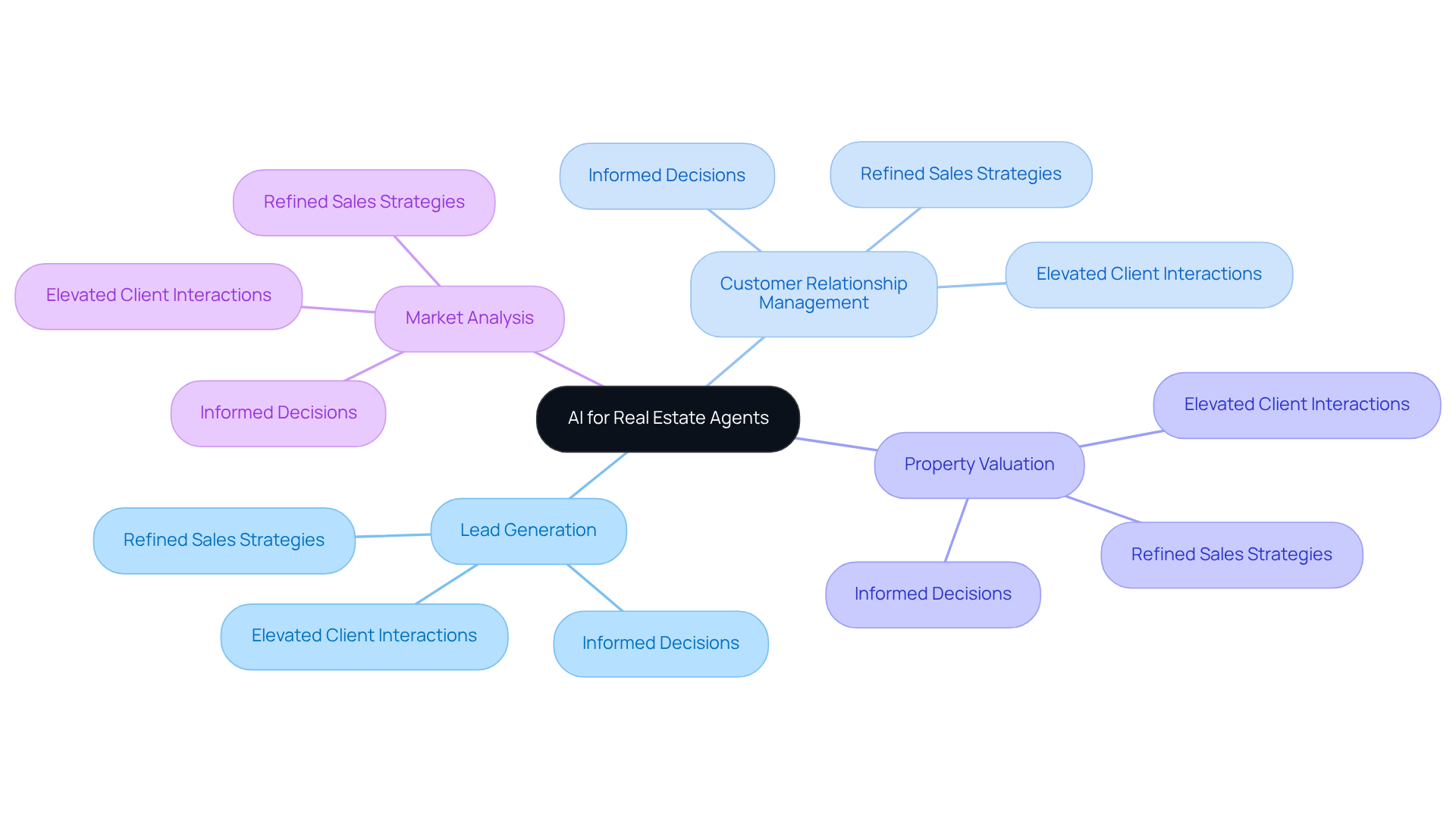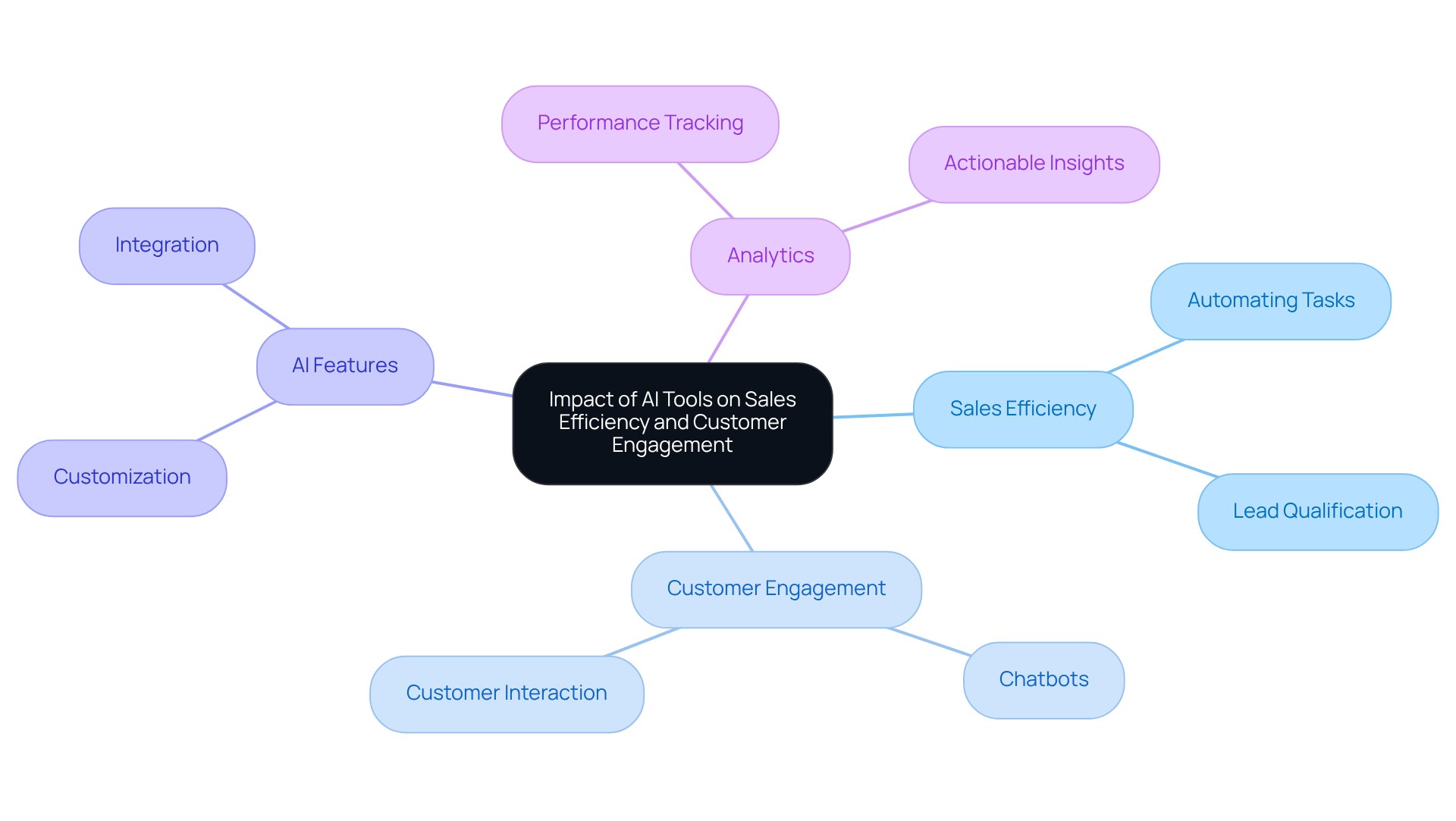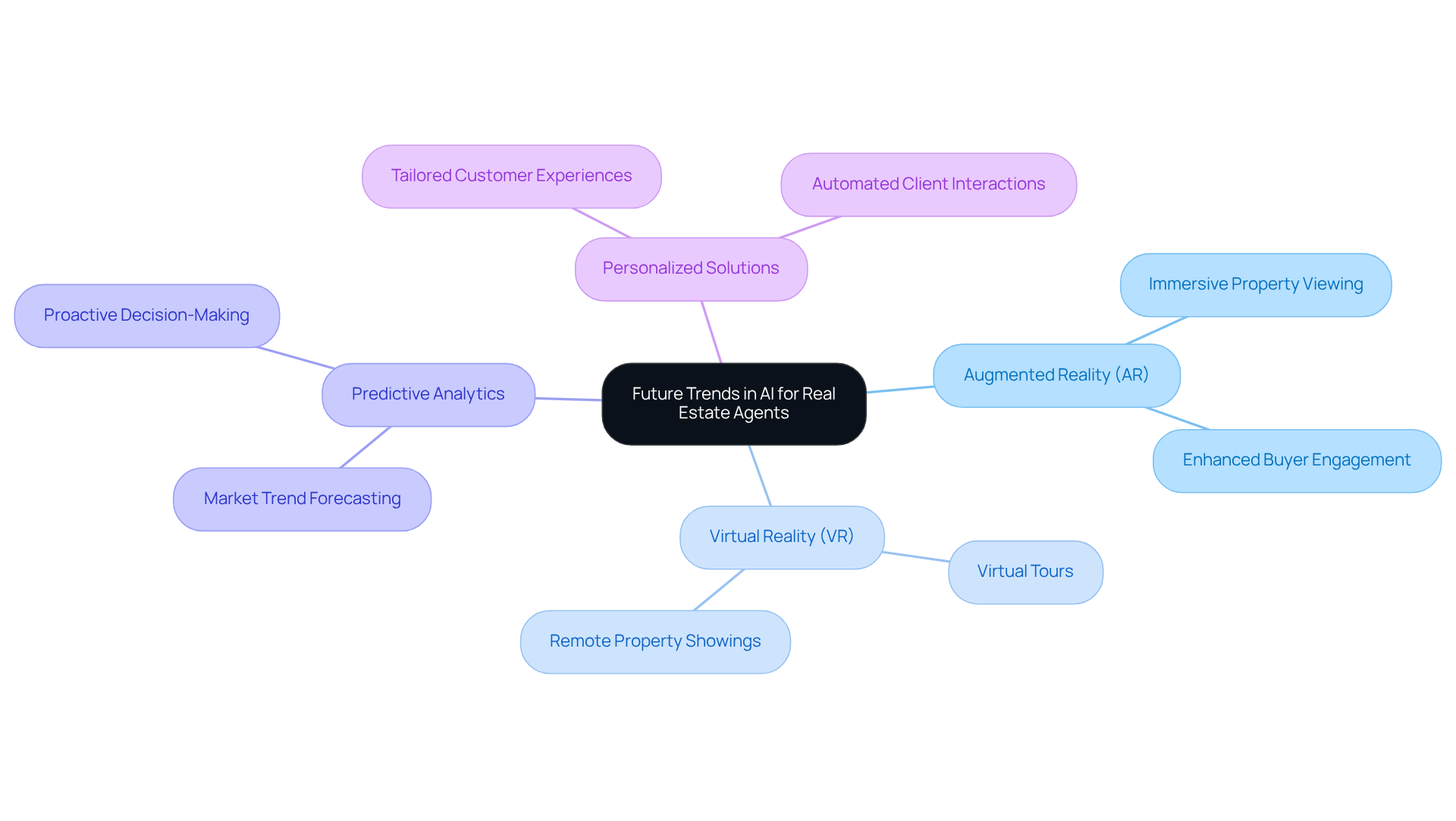Overview
AI for real estate agents significantly enhances their effectiveness by automating critical tasks such as:
- Lead generation
- Property valuation
- Market analysis
This automation ultimately leads to improved sales efficiency and heightened customer engagement. Advancements in AI technologies empower agents to make informed decisions and tailor their marketing strategies effectively. However, it is essential to address challenges such as:
- The initial investment required
- Potential client resistance
By proactively tackling these issues, agents can ensure a smoother integration of AI into their workflows, paving the way for a more productive and successful real estate practice.
Introduction
The integration of artificial intelligence into the real estate sector has revolutionized how agents operate, transforming traditional practices into streamlined, data-driven processes. By leveraging AI tools, real estate professionals can enhance lead generation, improve customer relationships, and gain insights into market trends, ultimately leading to more informed decision-making. However, as technology advances, the challenge remains: how can agents effectively navigate the complexities of AI adoption while ensuring they meet the evolving expectations of their clients?
Defining AI for Real Estate Agents
The use of AI for real estate agents signifies the application of advanced technologies aimed at enhancing various aspects of the property sales process. This encompasses the automation of essential tasks such as:
- Lead generation
- Customer relationship management
- Property valuation
- Market analysis
By harnessing machine learning algorithms and data analytics, AI for real estate agents provides agents with critical insights that empower them to:
- Make informed decisions
- Refine their sales strategies
- Elevate client interactions
The ultimate goal is to streamline operations and bolster the overall efficacy of property transactions, thereby yielding higher conversion rates and improved customer satisfaction.

The Evolution of AI in Real Estate Sales
The evolution of AI in property sales can be traced back to the early adoption of data analytics and CRM systems. Initially, these technologies aimed at automating basic tasks and managing client information. However, with significant advancements in machine learning and natural language processing, AI has evolved into a more sophisticated tool.
Today, tools utilizing AI for real estate agents possess the capability to analyze vast amounts of data, identifying market trends, predicting property values, and assessing buyer preferences. This evolution empowers property representatives to leverage AI for real estate agents and predictive analytics, enhancing decision-making and enabling tailored marketing strategies. As a result, their capacity to connect with prospective buyers has significantly improved.

Impact of AI Tools on Sales Efficiency and Customer Engagement
AI for real estate agents significantly enhances sales efficiency and customer engagement within the real estate sector. Intone's AI voice assistants exemplify this potential, as they can be seamlessly implemented and customized to meet specific business needs. By automating repetitive tasks such as lead qualification and follow-ups, AI for real estate agents enables representatives to focus on nurturing relationships with clients. With the ability to upload scripts, training materials, and call recordings, Intone ensures that the AI representative's interactions are relevant and timely. Additionally, the integration of telephony facilitates smooth call forwarding to the AI representative or the use of a built-in dialer, thereby elevating the overall customer experience.
Moreover, the use of AI for real estate agents, specifically AI-driven chatbots, is adept at managing initial inquiries and providing instant responses, which significantly enhances customer satisfaction. Intone's sophisticated analytics further empower agents by enabling performance tracking, agent comparison, and actionable insights through a live dashboard. This data-centric approach aids in identifying high-intent prospects, allowing for tailored marketing initiatives that enhance conversion rates and foster a more personalized customer experience. Ultimately, the integration of Intone's AI for real estate agents tools streamlines the sales process and cultivates greater customer loyalty.

Challenges and Considerations in Implementing AI for Real Estate
While the advantages of AI for real estate agents are substantial, it is crucial to acknowledge the obstacles that accompany the application of these technologies. One major hurdle is the initial investment required for AI tools and training, which can be significant. Furthermore, representatives may encounter resistance from clients who are unfamiliar with AI-driven processes, posing an additional challenge. Ensuring data privacy and compliance with regulations is critical, as real estate transactions involve sensitive information that must be handled with care.
To successfully navigate these challenges, representatives should focus on gradual integration, beginning with user-friendly tools that enhance existing workflows. Continuous education and transparent communication with clients about the benefits of AI for real estate agents can mitigate resistance and foster acceptance, ultimately paving the way for a smoother transition into this innovative landscape.

Future Trends in AI for Real Estate Agents
The future of AI for real estate agents is poised for significant innovation and integration. Emerging technologies, including augmented reality (AR) and virtual reality (VR), are set to complement AI tools, thereby providing immersive property viewing experiences that captivate potential buyers. Furthermore, advancements in predictive analytics will empower real estate representatives to forecast market trends with enhanced precision, facilitating proactive decision-making that can lead to strategic advantages.
As AI continues to evolve, we can anticipate a surge in personalized and automated solutions designed to enhance the customer experience. Real estate agents who embrace these transformative trends will be strategically positioned to thrive in a competitive market by effectively leveraging AI for real estate agents to meet the evolving needs of their clients.

Conclusion
The integration of AI into the real estate sector signifies a transformative shift that empowers agents to enhance their operational efficiency and client engagement. By automating essential tasks such as lead generation, property valuation, and market analysis, AI tools streamline processes and enable agents to make informed decisions, delivering personalized experiences to their clients.
Key insights reveal the evolution of AI from basic automation to sophisticated predictive analytics, significantly enhancing agents' ability to connect with potential buyers. The impact of AI tools, including voice assistants and chatbots, on sales efficiency and customer satisfaction is profound. While the implementation of AI presents challenges—such as initial investment and data privacy concerns—a gradual and transparent approach can facilitate successful integration.
Looking ahead, the future of AI in real estate is promising, with emerging technologies poised to further revolutionize the industry. By embracing these advancements, real estate agents can enhance their service offerings and strategically position themselves in a competitive market. The significance of AI's role in shaping the future of real estate underscores the imperative for agents to adapt and innovate, ensuring they effectively meet the evolving demands of their clients.
Frequently Asked Questions
What does AI for real estate agents encompass?
AI for real estate agents includes the application of advanced technologies to enhance various aspects of the property sales process, such as lead generation, customer relationship management, property valuation, and market analysis.
How does AI benefit real estate agents?
AI benefits real estate agents by providing critical insights through machine learning algorithms and data analytics, enabling them to make informed decisions, refine sales strategies, and elevate client interactions.
What is the ultimate goal of using AI in real estate?
The ultimate goal of using AI in real estate is to streamline operations and improve the overall efficacy of property transactions, resulting in higher conversion rates and enhanced customer satisfaction.
How has AI evolved in real estate sales?
AI in real estate sales has evolved from early data analytics and CRM systems aimed at automating basic tasks to sophisticated tools capable of analyzing large data sets, identifying market trends, predicting property values, and assessing buyer preferences.
What capabilities do modern AI tools for real estate agents possess?
Modern AI tools for real estate agents can analyze vast amounts of data, identify market trends, predict property values, and assess buyer preferences, enhancing decision-making and enabling tailored marketing strategies.
How has the use of AI impacted agents' ability to connect with buyers?
The use of AI has significantly improved agents' capacity to connect with prospective buyers by leveraging predictive analytics and enhanced decision-making capabilities.






